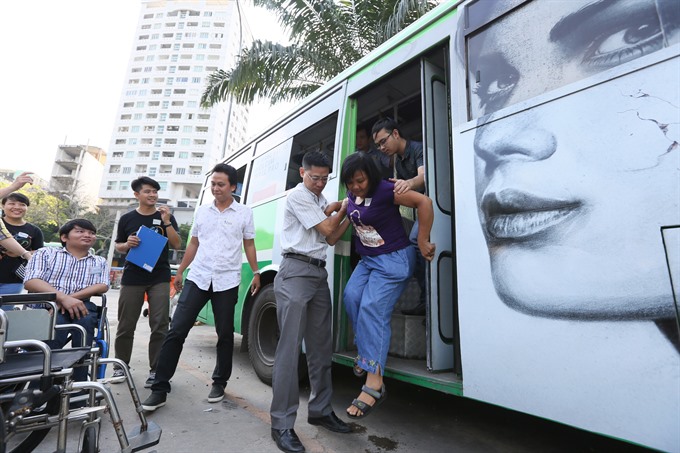 Society
Society

People with disabilities are thankful for the efforts HCM City has taken to increase their access to public buses, but say more can be done.
 |
| The HCM City-based Disabilities Research and Capacity Development (DRD) Centre and the Transport Management and Operation Centre yesterday provided training to the staff and managers of 22 transport companies in helping disabled people get into and off buses. Courtesy photo of DRD Centre |
HCM CITY — People with disabilities are thankful for the efforts HCM City has taken to increase their access to public buses, but say more can be done.
“I am very proud of the city’s bus system,” Nguyễn Văn Cử, deputy head of the HCM City-based Disabilities Research and Capacity Development (DRD) Centre, told a conference it organised to find ways to better help people with disabilities travel by buses and integrate into society in other ways.
Compared to other provinces and cities, buses in the city are better and easier for people with disabilities to use, Cử said.
However, the city should continue to improve and address shortcomings in service attitude and other aspects, he added.
Lê Hoàng Minh, deputy head of the city Department of Transportation, said that the city was one of the first localities in the country to exempt people with disabilities from buying bus tickets, before a provision to this effect was included in the 2012 Law on People With Disabilities.
The city now has 263 of its fleet of 2,512 buses with low or semi-low floors that help people with disabilities, especially wheel-chair users, get into buses as also those with automatic bridge-plate or ramps, more than double the 117 in 2012.
It is also introducing 1,680 new buses in a four-year (2014-2017) period, including 300 buses with low floors using compressed natural gas as fuel.
Moreover, 350 of 497 bus stops have been upgraded to have sloped entrances for wheel-chair users, Minh said. Bus stations in the city have staff on hand to guide people with disabilities on using the bus service better, he added.
Phan Thị Kim Vân, a wheelchair user and third-year student of the city’s University of Social Sciences and Humanities, said: “I am very addicted to commuting by bus. I take it everyday to college.”
However, the buses she uses have high floors, and whenever she has to board one, the staff and/or other passengers help out, she said.
Vân said the helpful attitude was markedly different from earlier days when the staff, instead of helping her, showed obvious irritation and bad temper.
“Now, the attitude of the buses’ staff has changed because I am a familiar face. Both the driver and the conductor are friendly,” Vân said.
Nguyễn Thị Huyền, another wheelchair user and student of the University of Information Technology, said she usually experiences a good and friendly attitude from bus staff. “They tell me to be careful, and get on to the pavement after getting off the bus,” she said.
Told to get off
However, there are times when buses refuse to take her. “On November 6, a bus conductor asked me to get down because there was no place for a wheelchair. This after I was helped to get into the bus,” she said.
Another wheelchair user, Trần Phương, complained that the sloped ramp to bus stops are often occupied by vendors, and others in similar situations said several bus stops are too narrow.
Phan Thành Tân of Biên Hòa City, who has a hearing impairment, has been rejected several times by bus staff because he uses a card that exempts him from buying a ticket.
Although the Law on People with Disabilities grants the exemption, several people who are entitled to it still pay the bus fares.
Nguyễn Tấn Tạo, deputy head of Transport Co-operative No.15, said all the bus drivers and other staff should be informed about the exemption and instructed to be friendly and helpful to people with disabilities.
They should take in the initiative in opening buses for people with disabilities and even help them get exemption cards from the Transport Management and Operation Centre, he said.
Other conference participants suggested that L.E.D. signboards and loudspeakers are installed at bus stops so that people with hearing and visual impairments know where they need to get off.
Other suggestions included smart phone apps, bus maps and directions to bus stops; signboards announcing ticket exemption for people with disabilities; simplified procedures for the exemption card; and broadcast of videos in public spaces on ways to help people with disabilities.
Training courses
Minh of the Transport Department said training courses have been opened to improve the attitude of bus drivers and staff.
More than 1,000 cameras have been installed to ensure compliance, and by the end of next year, smart cards will be piloted towards reducing discrimination against people using exemption cards.
The smart cards will be provided free to people with disabilities, he said.—VNS




